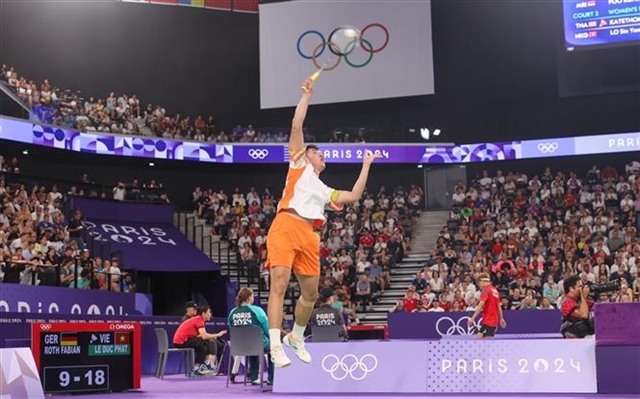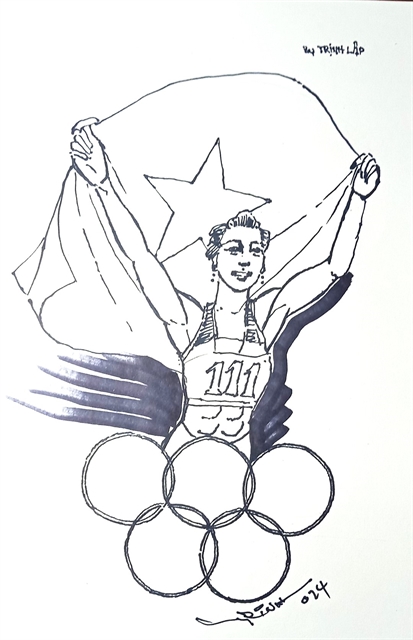 Sports
Sports

 |
| Illustration by Trịnh Lập |
By Thanh Nga
In yet another disappointing display, Vietnamese sports failed to clinch a single medal at the 2024 Paris Olympics, a stark contrast to the nation's dominance at the Southeast Asian (SEA) Games.
The image of weightlifter Trịnh Văn Vinh collapsing after failing all three snatch attempts may well symbolise the broader struggles faced by Việt Nam in the world's grandest sporting arena.
While Việt Nam has consistently topped the medal table at the SEA Games, with over 100 golds in both the 2022 and 2023 editions, the nation's performance at global events like the Asian Games (ASIAD) and the Olympics has been disappointing. At the Paris Olympics, other Southeast Asian countries such as the Philippines, Thailand, Malaysia, Singapore, and Indonesia secured medals, leaving Việt Nam as the only populous country in the region without a podium finish.
The success of these neighbouring nations can be attributed to their strategic focus on sports that leverage their athletes' strengths. For example, Panipak Wongpattanaki's gold in taekwondo's under-49kg category highlights Thailand's targeted investment in the right disciplines. Similarly, other countries in the region have excelled in lightweight categories in sports like weightlifting and badminton.
In contrast, Việt Nam’s sports development strategy appears to lack clear focus and prioritisation. Instead of concentrating resources on key sports and athletes, the country has spread its investments too thinly across numerous disciplines, diluting their impact and hindering the potential for standout performances.
Two decades ago, Việt Nam earned its first Olympic medal – a silver in taekwondo at the Sydney 2000 Games of Trần Hiếu Ngân – followed by a silver in weightlifting at the 2008 Beijing Olympics (Hoàng Anh Tuấn), and a bronze at the 2012 London Olympics (Trần Lê Quốc Toàn). These achievements showcased Việt Nam’s ability to identify and nurture talent in specific sports. However, the lack of a consistent, focused approach has led to a decline in recent Olympic cycles.
Limited funding is a significant obstacle. The annual sports budget in Việt Nam, ranging from VNĐ826 billion to VNĐ1.2 trillion over the past five years, is a fraction of what regional sports powerhouses invest.
For instance, Singapore invested millions of US dollars in swimmer Joseph Schooling, who famously defeated Michael Phelps in the 100m butterfly at the 2016 Rio Olympics. The Philippines similarly invested heavily in gymnast Carlos Yulo, who has won two Olympic golds, rewriting the nation's sports history.
Vietnamese athletes like shooter Trịnh Thu Vinh, despite receiving training support in countries like South Korea and Bulgaria, have struggled to match their counterparts from global shooting powerhouses. Vinh’s fourth-place finish on the world stage highlights her potential, but inconsistent and insufficient investment has hampered her chances of securing an Olympic medal.
Đặng Hà Việt, director of the Sports Authority of Việt Nam, acknowledges the multifaceted challenges in the country’s sports development. He points to a stable but insular domestic competition system, a lack of high-level international exposure, inadequate infrastructure for elite sport training, and a shortage of top-tier coaches capable of nurturing world-class athletes.
The root cause of these challenges, as Việt bluntly states, is the limited investment in elite sports. Major sports receive only slightly more resources than average, with just a couple of extra training trips per year. Funding often increases only when major tournaments like the SEA Games, ASIAD, or Olympics are approaching.
The way forward
Expert Đoàn Minh Xương stresses that Việt Nam must look beyond state funding and attract more private sector investment to make its sports programmes more self-sustaining. "Behind the success of top athletes are brands and businesses – this is the unchanging formula for success in sports," Xương says.
While sports like football, basketball, and volleyball have secured corporate partnerships in Việt Nam, many other disciplines struggle to attract similar support.
Lê Thị Hoàng Yến, deputy director of the Sports Authority of Việt Nam, notes that some domestic sports federations have made progress by attracting visionary individuals who work systematically. However, sports with less public appeal face greater challenges in securing sponsorships and advertising contracts. These federations must develop strategic marketing plans and train their staff in acquiring commercial partnerships.
In addition to diversifying funding sources, experts emphasise the importance of balancing elite sports with mass participation. Xương argues that "to go far, sports must step on both 'feet' simultaneously: mass sports and elite sports". Mass sports provide a foundation for discovering and nurturing talent while promoting physical activity and comprehensive athlete development.
The success of athletes like Julien Alfred, who made history with a gold medal in the women’s 100m for Saint Lucia, and South Korea’s dominance in archery (winning all five gold medals in Paris), demonstrate the power of integrating sports into the school system. These examples highlight the need for Việt Nam to prioritise school sports within its broader sports development strategy.
As Việt Nam awaits policy reforms and support mechanisms for the sports industry, the nation’s sports authorities must proactively recalibrate their strategies. This involves thoroughly researching the physical attributes and strengths of Vietnamese athletes to identify the sports that best suit them. By focusing investments on these targeted disciplines, Việt Nam can increase its chances of achieving success at major events like the Asian Games and the Olympics. VNS




